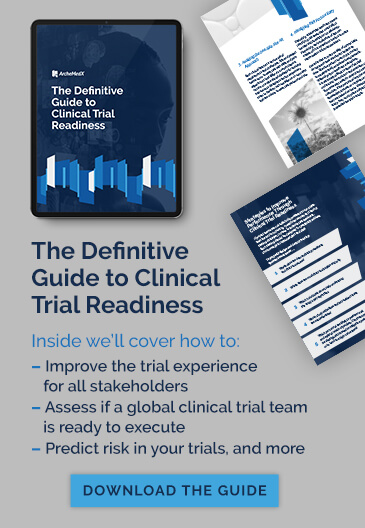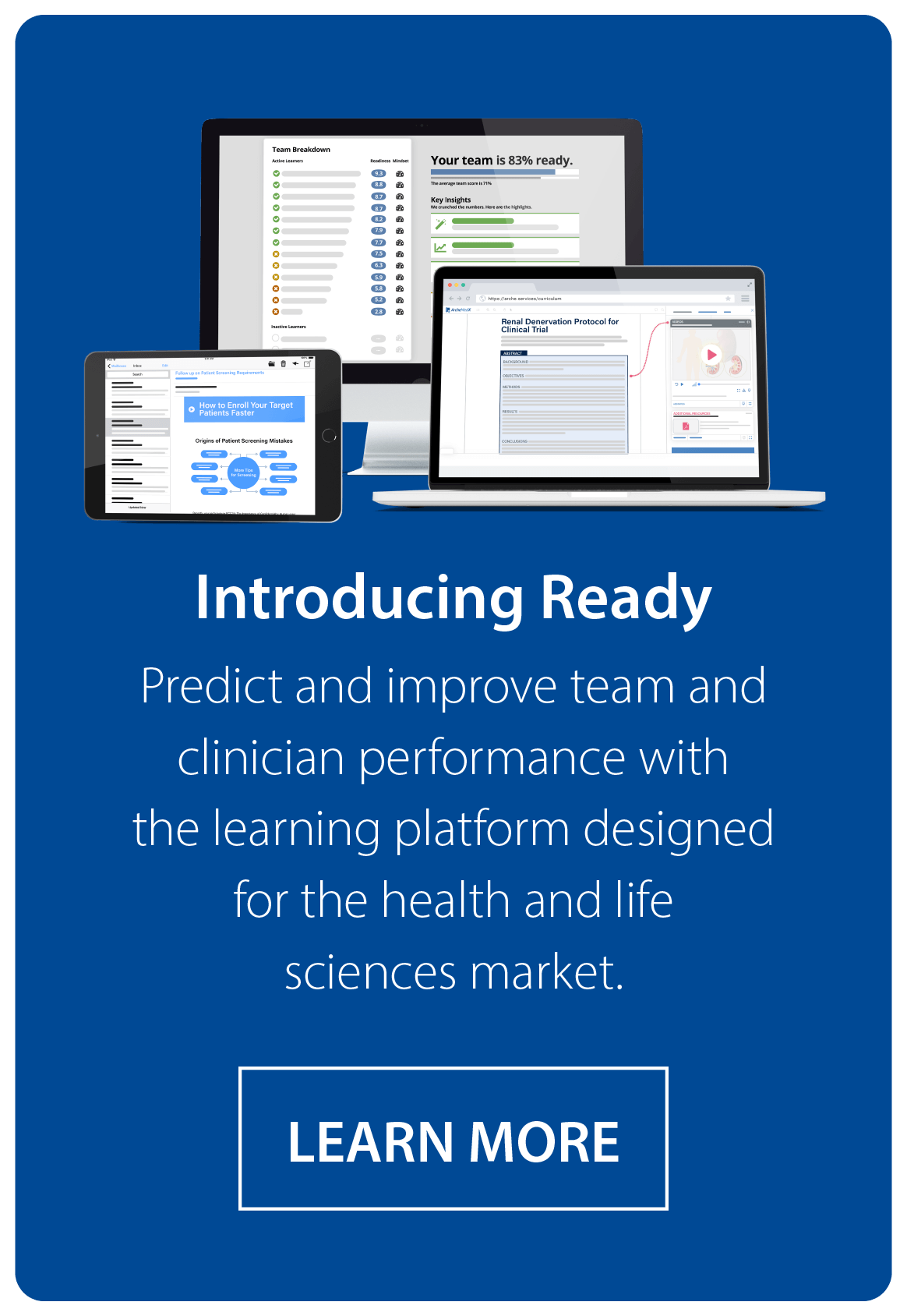 We recently spoke with Mike McLaughlin, Associate Director, Clinical Operations at Dermavant Sciences Inc., a specialty biopharmaceutical company developing innovative prescription therapies for dermatologic diseases. Dermavant is based in Long Beach, CA. He says that before 2020 “virtual clinical trials” was just a buzzword. Now we’ve been forced to adapt. So where does he see the biggest opportunities in adapting? Here are some of the most interesting excerpts from our discussion:
We recently spoke with Mike McLaughlin, Associate Director, Clinical Operations at Dermavant Sciences Inc., a specialty biopharmaceutical company developing innovative prescription therapies for dermatologic diseases. Dermavant is based in Long Beach, CA. He says that before 2020 “virtual clinical trials” was just a buzzword. Now we’ve been forced to adapt. So where does he see the biggest opportunities in adapting? Here are some of the most interesting excerpts from our discussion:
ArcheMedX:
You’ve crossed the entire spectrum of life sciences it seems, small CRO, big CRO, big pharma, small pharma. With all that experience, where do your interests lie today?
McLaughlin:
My greatest interest, regardless of company size and therapeutic area, is finding ways to run clinical trials better and more efficiently. There is so much technology available to us today, it really should be easier. We should be working smarter and not harder.
Everywhere I’ve worked, I’ve tried to implement that sort of change. If I can find potential opportunities for efficiency or introduce innovative methods that will reduce some of the problems we see, I’m personally much happier.
But it may surprise you to hear that I don’t see that our industry has made much improvement in efficiency across the lifecycle of the clinical trial — even during the last 20 years.
ArcheMedX:
That is surprising. Where are the best opportunities for innovation in clinical operations?
McLaughlin:
There is a huge opportunity to improve the clinical trial start up. There are common challenges, across nearly every study. For example – spending the time to physically evaluate a site – to ensure that they have the equipment and are more than just a P.O. Box. Plus – the contracts, the start-up documents with the clinical trial site, the trial site training, the site initiation visit. The entire process is rife for improvement.
Three or four years ago, the idea of “virtual clinical trials” wasn’t much more than a buzzword, but now it’s been accelerated to something that everyone is going to have to get onboard with.
There’s been a huge acceleration towards adopting remote meetings. So what other methods and innovations can we take advantage of during study start up? My belief is that human acceptance and adoption lags behind the technology.
ArcheMedX:
Clearly COVID-19 has forced this acceleration of virtual activities in the clinical trial. What else do you think COVID has done?
McLaughlin:
Another term that was a buzzword until recently is “patient centricity.” I believe that there will be a large movement toward more patient-centric studies because patients can’t physically come into the clinics. So we’ll have to be more focused on the patient’s needs, and adjusting our methods to support those patients.
I also think COVID-19 will be an accelerator of people actually utilizing and accepting the technology available today. Perhaps we will create some new technology. We’ll see widespread technology use in the trial as a norm instead of an alternative outlier.
There will always be studies that require human-to-human interaction, but I see virtual or partially virtual clinical trials as the future. Even the FDA is being much more open, allowing remote clinical visits, the delivery of study drugs directly to the patient, and online paperwork. They’re open to digital data collection via apps, and embracing wearable devices.
ArcheMedX:
So what challenges do you see to this future where virtual clinical trials are much more widespread?
McLaughlin:
I see a potential challenge in data quality – and it’s something I’m extremely interested in as well. Will there be a difference in the data quality based on the changes that we’re being forced to make?
I think we could see reduced data quality because humans won’t be as involved, but I say that with a caveat. It may not be that we truly need human interaction to ensure data quality, but that humans need to learn how to best use the technology to capture data accurately.
Just take a look at our mobile devices and their image capture, which are better than the human eye and mind in some ways. We just have to be able to harness that.
For example – in a dermatology trial, you could be having a visit with a patient over video and the physician could be inspecting your lesions over the video. What new imagery technologies will emerge that could capture better data, like the size, shape, and change from baseline for those lesions? Could that technology exceed a human’s ability to observe those changes? That’s really exciting to me.
Also, by adopting technology in these ways, we would be able to cut down visits for people living far away from study sites. How wonderful would it be to reduce the number of visits from 6 or 7 to just one or two — with the same quality of data?
ArcheMedX:
It does seem both wonderful and realistic for the future, but we still have to get there. What changes have you been forced to make for your ongoing trials in the short-term?
McLaughlin:
Unfortunately, due to COVID, we’ve shifted temporarily away from starting new studies and have placed our focus on our ongoing trials, to ensure subjects are able to safely complete the study.
Fortunately, I have to credit our sites – the staff was able to keep the studies going. We had lots of contingency plans – if a patient needed IP shipped, we did that. We performed remote clinic visits successfully. As much as possible, we performed monitoring visits remotely. We used web conferencing heavily, and even utilized redacted electronic documents so the CRA could verify certain types of information more thoroughly.
The sites that had active subjects opened at a reduced capacity and schedule, and ensured proper precautions everywhere possible: social distancing, screening, and other things that most facilities have enacted.
We’ve also done most of our retraining virtually.
ArcheMedX:
So with all of the changes you’ve been making – what are your priorities for the upcoming months, and supporting future trials?
McLaughlin:
At Dermavant, we’re focused on finishing our current studies, and carefully evaluating how we’re going to conduct and manage our upcoming trials.
We’re just beginning to gather information on what that will look like. We’re investigating how our partners will be able to help us conduct these trials on time, safely, and under budget. I do hope that companies will feel confident enough to begin or restart clinical trials by the end of this quarter.
ArcheMedX:
So what advice would you give to your clinical operations peers, especially at such a perilous time?
McLaughlin:
Stay away from crowds! Joking aside, I suggest that our industry fully embrace new ways of working and the technology that’s out there to help us today.
There’s always a learning curve – but humans can continue to learn new approaches and adapt to new methods. Push through that learning curve to discover what innovations will work in your clinical trials. We may be successful in finally driving the efficiencies we need in clinical research.
ArcheMedX:
Mike emphasized the need for innovation to improve and create efficiency in the clinical trial start-up phase. That theme is continually echoed in the industry. The fact that recent reports have shown clinical phases lengthening underscores the need for disruption. Big thinkers like Mike find the problems and are using COVID-19 as a catalyst for improving clinical trials.
Fortunately, clinical trial solutions like Ready exist to enable sponsors and CROs to adapt to deliver virtual capabilities in clinical trials today. Virtual investigator meetings, virtual site initiation, and ongoing virtual clinical training are all within reach today.





